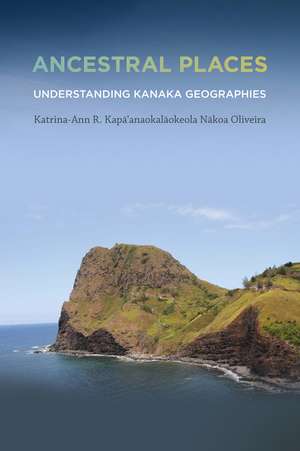Ancestral Places: Understanding Kanaka Geographies
Autor Katrina-Ann R. Kapa'anaokalaokeola Nakoa Oliveiraen Limba Engleză Paperback – mai 2014
Ancestral Places explores the deep connections that ancestral Kanaka (Native Hawaiians) enjoyed with their environment. It honors the mo‘olelo (historical accounts) of the ancestral places of our kupuna (ancestors), and reveals how these mo‘olelo and our relationships with the ‘aina (land) inform a Kanaka sense of place.
Katrina-Ann R. Kapa‘anaokalaokeola Nakoa Oliveira elucidates a Kanaka geography and provides contemporary scholars with insights regarding traditional culture—including the ways in which Kanaka utilize cartographic performances to map our ancestral places and retain our mo‘olelo, such as reciting creation accounts, utilizing nuances embedded in language, and dancing hula.
A Kanaka by birth, a kumu ‘olelo Hawai‘i (language teacher) by profession, and a geographer by training, Oliveira’s interests intersect at the boundary where words and place-making meet her ancestral land. Thus, Ancestral Places imbues the theoretical with sensual practice. The book’s language moves fluidly between Hawaiian and English, terms are nimbly defined, and the work of the field is embodied: geographic layers are enacted within the text, new understandings created—not just among lexica, but amidst illustrations, charts, terms, and poetry.
In Ancestral Places, Oliveira reasserts both the validity of ancestral knowledge systems and their impact in modernity. Her discussion of Kanaka geographies encompasses the entire archipelago, offering a new framework in Kanaka epistemology.
Katrina-Ann R. Kapa‘anaokalaokeola Nakoa Oliveira elucidates a Kanaka geography and provides contemporary scholars with insights regarding traditional culture—including the ways in which Kanaka utilize cartographic performances to map our ancestral places and retain our mo‘olelo, such as reciting creation accounts, utilizing nuances embedded in language, and dancing hula.
A Kanaka by birth, a kumu ‘olelo Hawai‘i (language teacher) by profession, and a geographer by training, Oliveira’s interests intersect at the boundary where words and place-making meet her ancestral land. Thus, Ancestral Places imbues the theoretical with sensual practice. The book’s language moves fluidly between Hawaiian and English, terms are nimbly defined, and the work of the field is embodied: geographic layers are enacted within the text, new understandings created—not just among lexica, but amidst illustrations, charts, terms, and poetry.
In Ancestral Places, Oliveira reasserts both the validity of ancestral knowledge systems and their impact in modernity. Her discussion of Kanaka geographies encompasses the entire archipelago, offering a new framework in Kanaka epistemology.
Preț: 161.11 lei
Nou
Puncte Express: 242
Preț estimativ în valută:
30.83€ • 32.11$ • 26.06£
30.83€ • 32.11$ • 26.06£
Carte indisponibilă temporar
Doresc să fiu notificat când acest titlu va fi disponibil:
Se trimite...
Preluare comenzi: 021 569.72.76
Specificații
ISBN-13: 9780870716737
ISBN-10: 0870716735
Pagini: 216
Dimensiuni: 152 x 229 x 18 mm
Greutate: 0.29 kg
Ediția:1
Editura: Oregon State University Press
Colecția Oregon State University Press
ISBN-10: 0870716735
Pagini: 216
Dimensiuni: 152 x 229 x 18 mm
Greutate: 0.29 kg
Ediția:1
Editura: Oregon State University Press
Colecția Oregon State University Press
Notă biografică
Katrina-Ann R. Kapa‘anaokalaokeola Nakoa Oliveira is a Kanaka scholar. She was born on the island of O‘ahu and raised on the islands of Maui and O‘ahu. She is an associate professor of Hawaiian and the director of Kawaihuelani Center for Hawaiian Language within Hawai‘inuiakea School of Hawaiian Knowledge at the University of Hawai‘i at Manoa. She earned dual Bachelor’s degrees in Hawaiian Language and Hawaiian Studies as well as a Master’s and a PhD in geography.
Descriere
Ancestral Places is a revealing journey through the language and practices of a traditional knowledge system, offering a Hawaiian epistemological framework that enhances our understanding of place.
